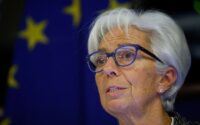JPMorgan is the unlucky owner of the fake nickel uncovered by the London Metal Exchange—really just bags of rocks
The London Metal Exchange announced on Friday that it had discovered that several shipments of nickel in one of its warehouses didn’t contain nickel at all. The exchange said it was invalidating nine shipments due to the mishap, and that it would delay the relaunch of nickel trading during Asia hours—suspended since the nickel trading chaos over a year earlier.
Media reports quickly revealed what the shipments contained instead of the valuable metal: bags of rocks.
Then, on Monday, news outlets uncovered the rocks’ unlucky owner: the Wall Street bank JPMorgan.
Nickel is used in industrial processes, including the creation of stainless steel and other alloys. It’s also a key component in the lithium-ion batteries used to power electric cars, meaning demand is likely to skyrocket as the EV boom continues.
In its Friday statement, the LME said that the fraud was “evident, from among other things, by the weight of the bags.” LME-approved warehouses—which are not owned by the exchange—are meant to weigh and inspect metal shipments before accepting it into storage.
While fraudulent goods can be fairly common in the metal trading world, goods are usually trusted to be legitimate once they arrive in an LME-approved warehouse, notes Bloomberg.
JPMorgan was likely unaware of the contents of its supposed nickel shipments, as they were already in the warehouse when the bank purchased them, Bloomberg reports. The responsibility for further checks would lie with either the London Metal Exchange or the operator of the warehouse.
JPMorgan declined to comment.
The total amount of the nickel caught up in the scandal is small: 54 metric tons of nickel is just 0.1% of what the London Metal Exchange deposits in its warehouses. At current prices, that amount of nickel is worth about $1.26 million.
Yet this is the second scandal involving fake nickel in as many months. In February, commodity trader Trafigura said it could lose over half a billion dollars after discovering that nickel shipments it bought instead contained less valuable materials.
Nickel chaos
The fake nickel scandal is a blow for the London Metal Exchange, which is owned by Hong Kong Exchanges and Clearing, as it tries to recover from its trading chaos just over a year ago.
Last March, the LME controversially suspended trading for over a week after nickel prices surged past $100,000 a ton. Nickel prices initially rose due to supply concerns following Russia’s invasion of Ukraine. That in turn squeezed short-sellers who had bet against the metal, including Chinese metal tycoon Xiang Guangda, founder of the Tsingshan Holding Group.
Trading in nickel is still suspended during Asia hours due to the crisis, and was scheduled to resume on March 20—until the LME postponed the resumption by a week thanks to its discovery of the fake nickel shipments.
Several trading firms that had their nickel trades canceled are now suing the London Metals Exchange. Hedge fund Elliott Management and trading firm Jane Street filed the first lawsuits last June, seeking a combined $572 million in damages.
The London Metal Exchange has dismissed such suits as “without merit,” and says it “acted to secure a fair and orderly market in the interests of the market as a whole.”
The London Metal Exchange’s decisions last March are also coming under regulatory scrutiny. Earlier this month, the Financial Conduct Authority, a U.K. financial regulator, said it would launch an inquiry into the LME’s conduct, the first probe into a U.K.-based exchange.
Correction, March 21, 2023: An earlier version of this article misstated the action the London Metal Exchange took on Friday.
This story was originally featured on Fortune.com
More from Fortune:
[ad_2]
Source link
